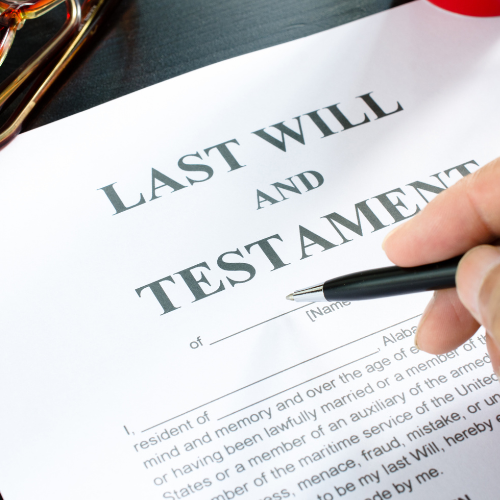Is the Executor Friend or Foe? – Part 1 of 4

An Opportunity for Financial Advisors to Guide Heirs and Recruit New Clients
by Ankie Engelbrecht
Dive into part one of this four-part series exploring an overlooked area where financial advice is critically needed. Financial advisors are closely monitored by the FAIS Act to provide quality advice to clients during their lifetimes. However, after a client's passing, heirs are often left navigating complex financial decisions without guidance. Stay tuned for insights on how to navigate this sensitive space.
Introduction:
"How do you want your inheritance – in cash or the original investments of the deceased?" This seemingly straightforward question from a professional executor to the heirs of a deceased estate can have profound financial implications.
At first glance, the question seems well-intentioned, aiming to cater to the heir's needs. However, a deeper analysis unveils that regardless of the intent, the question can create a misleading impression. It suggests that opting for cash would have no impact on the final value of the inheritance, insinuating no additional estate duty (death taxes), executor's fees, or capital gains tax (CGT). Unfortunately, this is often not the case.
The Gap in Financial Advice:
The gap in financial advice at this critical juncture leads to heirs making uninformed decisions. South African executors, focused on winding up the estate, are not required by law to disclose the financial consequences associated with an heir's choice between cash and investments.
An uninformed heir might think: "Choosing cash is convenient, and I can use it to settle my debts immediately. The choice doesn't seem to matter; it's just a matter of timing. The executor is handling the estate, so why not let them take care of this too?" Yet, opting for the cash equivalent can inadvertently lead to additional estate duty, executor's fees, and CGT.
This article highlights the need for financial advisors to step in and provide valuable guidance, potentially safeguarding heirs from wealth erosion and simultaneously acquiring new clients.
Criteria to Consider Before Opting for Cash Equivalent of an Inheritance:
The financial impact of choosing the cash equivalent of an inheritance varies based on several criteria:
- Form of Inheritances: Are the inheritances growth-type assets like listed shares, share based unit trust funds, gold coins, etc.? Over time, these assets can accumulate capital gains, thereby potentially incurring additional CGT, estate duty, and executor's fees.
- Magnitude of such Inheritances: Larger inheritances can lead to more pronounced additional CGT, estate duty, etc..
- Marginal Income Tax Rate: A higher tax rate within the estate can accentuate the impact of extra CGT.
- Time to Wind Up the Estate:
The process of winding up an estate is intricate and can be protracted due to several contributing factors. Among these is the time an executor requires to sell inheritances out of the estate, which can be lengthy for a host of legitimate reasons.
Legal Prescriptions and Claims:
For instance, legally prescribed periods dictate a window for creditors, heirs, and ex-spouses to submit claims against the deceased's estate, ensuring that all obligations are settled before asset distribution commences.
Detailed Inventories:
In addition, the executor must meticulously compile a complete inventory of not only the deceased’s various income streams and assets, including investments, but also the assets of a surviving spouse in cases of a with-accrual marital regime. This ensures a thorough understanding and fair allocation of the estate's assets.
Disputes and Ambiguities:
The process can be further delayed due to disputes among heirs, especially if the deceased's will contains ambiguous clauses. Such ambiguities can lead to legal disputes and prolonged court cases, causing strife among the beneficiaries.
Master of the High Court’s Efficiency:
The efficiency of the office of the Master of the High Court ('Master') also plays a significant role. The Master, responsible for approving the executor's appointment, requires various documents to be submitted periodically throughout the estate's winding up. Administrative delays at the Master's office can further extend the process.
Financial Ramifications:
All these elements collectively lengthen the time required to wind up an estate, allowing growth-type inheritances to accumulate capital gains. This delay can inadvertently result in additional Capital Gains Tax (CGT), executor's fees, and estate duty, especially if heirs opt for the cash equivalent of their inheritance.
If a deceased estate meets all the above criteria, the heir may face significant wealth leakages by opting for the cash equivalent of the inheritance.
Why You Shouldn't Miss Part 2: Unveiling the Impact on Inheritance Value
As we conclude this introductory chapter of our series 'Is the Executor Friend or Foe?', we've only scratched the surface of the intricate decisions heirs must navigate. The stakes are high, and the choices complex. In Part 2, we'll dive into a detailed exploration of how an heir's decision – whether to accept inheritance in cash or retain the original investments – can significantly alter the ultimate value of their inheritance. The insights awaiting you are not only thought-provoking but essential for anyone facing these critical decisions or advising those who do.
We invite you to continue this journey with us. To ensure you don't miss the valuable insights of Part 2 and the rest of our series, click the link below. Stay informed, stay ahead, and unravel the mysteries of estate management with us.